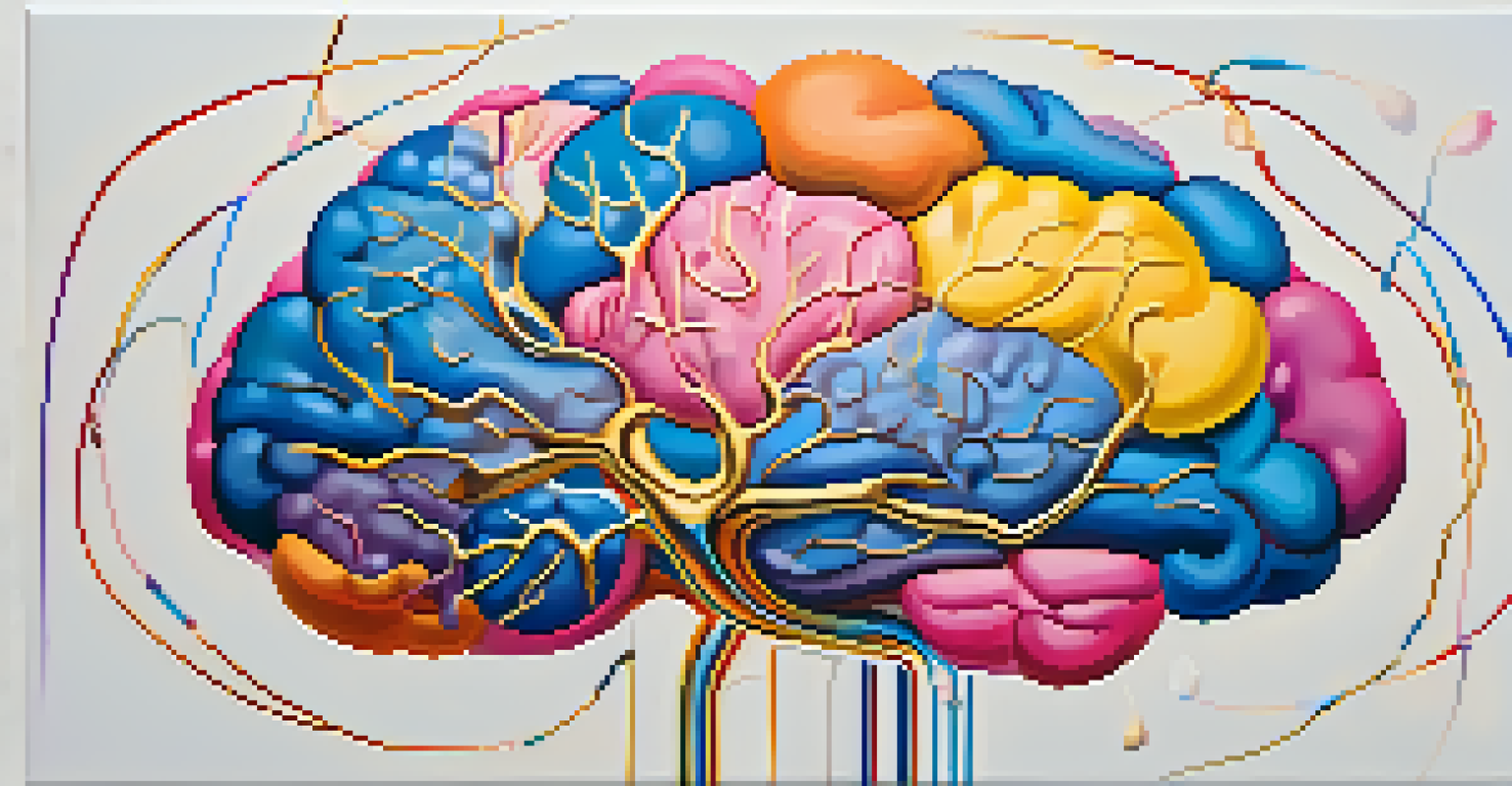The Neurobiology of Empathy and Psychedelic Substances

Understanding Empathy: The Basics of Connection
Empathy is the ability to understand and share the feelings of others. It’s like putting yourself in someone else's shoes, feeling their joy or pain as if it were your own. This fundamental human trait is crucial for building relationships and fostering community. At its core, empathy is rooted in our brain's social circuits, which allow us to connect with others on an emotional level.
Empathy is about finding echoes of another person in yourself.
Research shows that specific areas in the brain, like the anterior insula and the anterior cingulate cortex, play pivotal roles in empathetic responses. When we witness someone in distress, these brain regions activate, prompting feelings of compassion and a desire to help. This neural response underscores empathy's evolutionary significance, enhancing social bonding and cooperation among individuals.
However, empathy isn’t just an automatic response; it can also be cultivated. Engaging in mindfulness practices, for instance, can enhance our empathetic abilities. By fostering a deeper awareness of our own emotions, we can better understand and connect with the emotions of others, creating a more compassionate society.
Psychedelic Substances: A Brief Overview
Psychedelics, such as psilocybin (found in magic mushrooms) and LSD, are substances that alter perception and consciousness. Many people may have heard about their use in recreational settings, but their potential therapeutic benefits are gaining recognition. These substances interact primarily with serotonin receptors in the brain, leading to profound changes in mood, perception, and thought processes.

In recent years, scientific research has increasingly focused on the therapeutic potential of psychedelics for conditions like depression, anxiety, and PTSD. Early studies suggest that these substances can catalyze significant emotional breakthroughs and insights, often leading to lasting changes in perspective. This has spurred a renewed interest in understanding how psychedelics might affect our emotional landscapes, including empathy.
Empathy Enhances Connections
Empathy allows us to understand and share the feelings of others, fostering deeper emotional connections and community.
Interestingly, many individuals report heightened feelings of connection and compassion after psychedelic experiences. This phenomenon raises important questions about how these substances might facilitate deeper empathetic connections and promote emotional healing among users.
The Neurobiology of Psychedelics: How They Work
Understanding the neurobiology of psychedelics requires a closer look at their interaction with the brain’s serotonin system. Psychedelics mimic serotonin, binding to its receptors and leading to altered states of consciousness. This can result in changes in thought patterns, sensory perception, and emotional responses, creating a unique experience for each individual.
The greatest gift of human beings is that we have the power of empathy.
Research indicates that psychedelics may promote neuroplasticity, the brain's ability to form new neural connections. This can be incredibly beneficial for individuals seeking to break free from rigid thought patterns associated with mental health issues. By facilitating new ways of thinking, psychedelics may help to enhance emotional flexibility and empathy, allowing individuals to connect more deeply with others.
Moreover, psychedelics can create a sense of ego dissolution, where individuals feel less confined by their personal identity. This experience can lead to greater feelings of unity with others, fostering empathy and compassion. In essence, psychedelics may offer a unique window into understanding not just ourselves, but the emotional lives of those around us.
Empathy Enhancement: The Role of Psychedelics
Several studies have begun to explore how psychedelics can enhance empathy. Participants in clinical trials often report feeling a sense of interconnectedness with others and a greater understanding of their emotions during and after psychedelic experiences. This heightened empathy can lead to transformative experiences, altering how individuals perceive themselves and their relationships.
One notable study found that participants who experienced psychedelics showed increased emotional intelligence and compassion. By allowing individuals to access deeper emotional states, psychedelics can break down barriers of isolation, fostering a sense of community and understanding. This can be particularly powerful in therapeutic settings, where empathy is essential for healing.
Psychedelics Boost Empathy
Research indicates that psychedelics can enhance empathetic feelings, leading to greater emotional understanding and compassion among users.
Furthermore, the insights gained from psychedelic experiences can encourage individuals to act more empathetically in their daily lives. This ripple effect can lead to more compassionate interactions, ultimately enhancing societal well-being. As we continue to explore this connection, the potential for psychedelics to serve as tools for empathy expansion becomes increasingly intriguing.
Therapeutic Applications: Healing Through Connection
The therapeutic applications of psychedelics are emerging as a promising avenue for mental health treatment. Many therapists are now incorporating these substances into guided sessions, facilitating a safe space for patients to explore their emotions. This approach leverages the power of psychedelics to deepen emotional connections and enhance therapeutic outcomes.
In these settings, individuals often experience profound insights into their relationships and emotional challenges. By fostering a sense of empathy towards themselves and others, patients can work through trauma and develop healthier coping mechanisms. This therapeutic bond between therapist and patient is crucial, as it allows for open dialogue and emotional exploration.
As more research supports the efficacy of psychedelics in therapeutic contexts, the potential to heal through enhanced empathy becomes clearer. This shift could redefine how we approach mental health treatment, highlighting the importance of connection and understanding in the healing process.
Challenges and Considerations in Research
While the potential benefits of psychedelics on empathy are exciting, there are challenges and ethical considerations in this field of research. The legal status of many psychedelic substances poses significant barriers to conducting comprehensive studies. Researchers must navigate complex regulations to explore the therapeutic potential of these compounds fully.
Additionally, the subjective nature of psychedelic experiences makes it challenging to quantify their effects on empathy and emotional well-being. Researchers are tasked with developing reliable metrics to measure changes in emotional states and connections with others. This requires innovative approaches to data collection and analysis.
Therapeutic Uses of Psychedelics
The integration of psychedelics in therapy can facilitate profound emotional insights, helping individuals heal through enhanced empathy.
Lastly, there is a need for responsible usage education. As interest in psychedelics grows, ensuring that individuals are informed about safe practices and potential risks is crucial. By fostering a culture of responsible use, we can maximize the benefits of psychedelics while minimizing potential harm.
The Future of Empathy and Psychedelic Research
Looking ahead, the future of empathy and psychedelic research is promising. As societal attitudes toward these substances evolve, we may see increased funding and support for scientific studies. This could lead to breakthroughs that enhance our understanding of how psychedelics can be utilized to foster empathy and emotional healing.
Moreover, interdisciplinary collaborations between neuroscientists, psychologists, and spiritual leaders can enrich our understanding of these experiences. By combining scientific inquiry with experiential wisdom, we can create a more holistic approach to empathy and healing. This collaborative spirit could pave the way for innovative therapies that integrate the benefits of psychedelics.

In conclusion, the intersection of empathy and psychedelics offers a fascinating glimpse into the future of mental health treatment. As we continue to explore this connection, we may unlock new pathways for fostering compassion and understanding in ourselves and others, ultimately contributing to a more empathetic world.